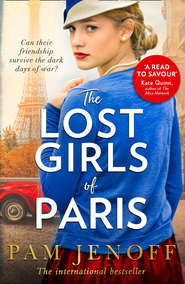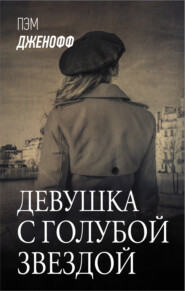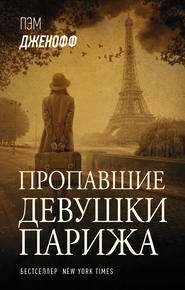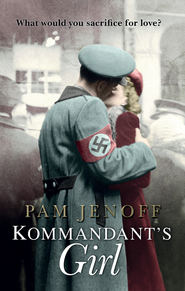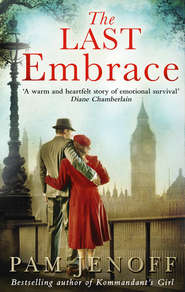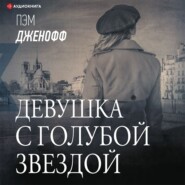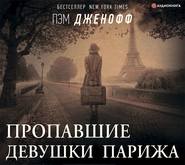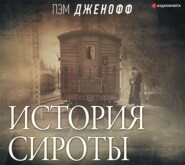По всем вопросам обращайтесь на: info@litportal.ru
(©) 2003-2024.
✖
The Orphan's Tale: The phenomenal international bestseller about courage and loyalty against the odds
Автор
Год написания книги
2018
Настройки чтения
Размер шрифта
Высота строк
Поля
Noa (#uce6a8b50-3b0b-5ba3-ad0b-6cbda78e7037)
Germany, 1944
The sound comes low like the buzzing of the bees that once chased Papa across the farm and caused him to spend a week swathed in bandages.
I set down the brush I’d been using to scrub the floor, once-elegant marble now cracked beneath boot heels and set with fine lines of mud and ash that will never lift. Listening for the direction of the sound, I cross the station beneath the sign announcing in bold black: Bahnhof Bensheim. A big name for nothing more than a waiting room with two toilets, a ticket window and a wurst stand that operates when there is meat to be had and the weather is not awful. I bend to pick up a coin at the base of one of the benches, pocket it. It amazes me the things that people forget or leave behind.
Outside, my breath rises in puffs in the February night air. The sky is a collage of ivory and gray, more snow threatening. The station sits low in a valley, surrounded by lush hills of pine trees on three sides, their pointed green tips poking out above snow-covered branches. The air has a slightly burnt smell. Before the war, Bensheim had been just another tiny stop that most travelers passed through without noticing. But the Germans make use of everything it seems, and the location is good for parking trains and switching out engines during the night.
I’ve been here almost four months. It hadn’t been so bad in the autumn and I was happy to find shelter after I’d been sent packing with two days’ worth of food, three if I stretched it. The girls’ home where I lived after my parents found out I was expecting and kicked me out had been located far from anywhere in the name of discretion and they could have dropped me off in Mainz, or at least the nearest town. They simply opened the door, though, dismissing me on foot. I’d headed to the train station before realizing that I had nowhere to go. More than once during my months away, I had thought of returning home, begging forgiveness. It was not that I was too proud. I would have gotten down on my knees if I thought it would do any good. But I knew from the fury in my father’s eyes the day he forced me out that his heart was closed. I could not stand rejection twice.
In a moment of luck, though, the station had needed a cleaner. I peer around the back of the building now toward the tiny closet where I sleep on a mattress on the floor. The maternity dress is the same one I wore the day I left the home, except that the full front now hangs limply. It will not always be this way, of course. I will find a real job—one that pays in more than not-quite-moldy bread—and a proper home.
I see myself in the train station window. I have the kind of looks that just fit in, dishwater hair that whitens with the summer sun, pale blue eyes. Once my plainness bothered me; here it is a benefit. The two other station workers, the ticket girl and the man at the kiosk, come and then go home each night, hardly speaking to me. The travelers pass through the station with the daily edition of Der Stürmer tucked under their arms, grinding cigarettes into the floor, not caring who I am or where I came from. Though lonely, I need it that way. I cannot answer questions about the past.
No, they do not notice me. I see them, though, the soldiers on leave and the mothers and wives who come each day to scan the platform hopefully for a son or husband before leaving alone. You can always tell the ones who are trying to flee. They try to look normal, as if just going on vacation. But their clothes are too tight from the layers padded underneath and bags so full they threaten to burst at any second. They do not make eye contact, but hustle their children along with pale, strained faces.
The buzzing noise grows louder and more high-pitched. It is coming from the train I’d heard screech in earlier, now parked on the far track. I start toward it, past the nearly empty coal bins, most of their stores long taken for troops fighting in the east. Perhaps someone has left on an engine or other machinery. I do not want to be blamed, and risk losing my job. Despite the grimness of my situation, I know it could be worse—and that I am lucky to be here.
Lucky. I’d heard it first from an elderly German woman who shared some herring with me on the bus to Den Hague after leaving my parents. “You are the Aryan ideal,” she told me between fishy lip smacks, as we wound through detours and cratered roads.
I thought she was joking; I had plain blond hair and a little stump of a nose. My body was sturdy—athletic, until it had begun to soften out and grow curvy. Other than when the German had whispered soft words into my ear at night, I had always considered myself unremarkable. But now I’d been told I was just right. I found myself confiding in the woman about my pregnancy and how I had been thrown out. She told me to go to Wiesbaden, and scribbled a note saying I was carrying a child of the Reich. I took it and went. It did not occur to me whether it was dangerous to go to Germany or that I should refuse. Somebody wanted children like mine. My parents would have sooner died than accepted help from the Germans. But the woman said they would give me shelter; how bad could they be? I had nowhere else to go.
I was lucky, they said again when I reached the girls’ home. Though Dutch, I was considered of Aryan race and my child—otherwise shamed as an uneheliches Kind, conceived out of wedlock—might just be accepted into the Lebensborn program and raised by a good German family. I’d spent nearly six months there, reading and helping with the housework until my stomach became too bulky. The facility, if not grand, was modern and clean, designed to deliver babies in good health to the Reich. I’d gotten to know a sturdy girl called Eva who was a few months further along than me, but one night she awoke in blood and they took her to the hospital and I did not see her again. After that, I kept to myself. None of us would be there for long.
My time came on a cold October morning when I stood up from the breakfast table at the girls’ home and my water broke. The next eighteen hours were a blur of awful pain, punctuated by words of command, without encouragement or a soothing touch. At last, the baby had emerged with a wail and my entire body shuddered with emptiness, a machine shutting down. A strange look crossed the nurse’s face.
“What is it?” I demanded. I was not supposed to see the child. But I struggled against pain to sit upright. “What’s wrong?”
“Everything is fine,” the doctor assured. “The child is healthy.” His voice was perturbed, though, face stormy through thick glasses above the draped cream sheet. I leaned forward and a set of piercing coal eyes met mine.
Those eyes that were not Aryan.
I understood then the doctor’s distress. The child looked nothing like the perfect race. Some hidden gene, on my side or the German’s, had given him dark eyes and olive skin. He would not be accepted into the Lebensborn program.
My baby cried out, shrill and high-pitched, as though he had heard his fate and was protesting. I had reached for him through the pain. “I want to hold him.”
The doctor and the nurse, who had been recording details about the child on some sort of form, exchanged uneasy looks. “We don’t, that is, the Lebensborn program does not allow that.”
I struggled to sit up. “Then I’ll take him and leave.” It had been a bluff; I had nowhere to go. I had signed papers giving up my rights when I arrived in exchange for letting me stay, there were hospital guards... I could barely even walk. “Please let me have him for a second.”
“Nein.” The nurse shook her head emphatically, slipping from the room as I continued to plead.
Once she was out of sight, something in my voice forced the doctor to relent. “Just for a moment,” he said, reluctantly handing me the child. I stared at the red face, inhaled the delicious scent of his head that was pointed from so many hours of struggling to be born and I focused on his eyes. Those beautiful eyes. How could something so perfect not be their ideal?
He was mine, though. A wave of love crested and broke over me. I had not wanted this child, but in that moment, all the regret washed away, replaced by longing. Panic and relief swept me under. They would not want him now. I’d have to take him home because there was no other choice. I would keep him, find a way...
Then the nurse returned and ripped him from my arms.
“No, wait,” I protested. As I struggled to reach for my baby, something sharp pierced my arm. My head swam. Hands pressed me back on the bed. I faded, still seeing those dark eyes.
I awoke alone in that cold, sterile delivery room, without my child, or a husband or mother or even a nurse, an empty vessel that no one wanted anymore. They said afterward that he went to a good home. I had no way of knowing if they were telling the truth.
I swallow against the dryness of my throat, forcing the memory away. Then I step from the station into the biting cold air, relieved that the Schutzpolizei des Reiches, the leering state police who patrol the station, are nowhere to be seen. Most likely they are fighting the cold in their truck with a flask. I scan the train, trying to pinpoint the buzzing sound. It comes from the last boxcar, adjacent to the caboose—not from the engine. No, the noise comes from something inside the train. Something alive.
I stop. I have made it a point to never go near the trains, to look away when they pass by—because they are carrying Jews.
I was still living at home in our village the first time I had seen the sorry roundup of men, women and children in the market square. I had run to my father, crying. He was a patriot and stood up for everything else—why not this? “It’s awful,” he conceded through his graying beard, stained yellow from pipe smoke. He had wiped my tear-stained cheeks and given me some vague explanation about how there were ways to handle things. But those ways had not stopped my classmate Steffi Klein from being marched to the train station with her younger brother and parents in the same dress she’d worn to my birthday a month earlier.
The sound continues to grow, almost a keening now, like a wounded animal in the brush. I scan the empty platform and peer around the edge of the station. Can the police hear the noise, too? I stand uncertainly at the platform’s edge, peering down the barren railway tracks that separate me from the boxcar. I should just walk away. Keep your eyes down, that has been the lesson of the years of war. No good ever came from noticing the business of others. If I am caught nosing into parts of the station where I do not belong, I will be let go from my job, left without a place to live, or perhaps even arrested. But I have never been any good at not looking. Too curious, my mother said when I was little. I have always needed to know. I step forward, unable to ignore the sound that, as I draw closer now, sounds like cries.
Or the tiny foot that is visible through the open door of the railcar.
I pull back the door. “Oh!” My voice echoes dangerously through the darkness, inviting detection. There are babies, tiny bodies too many to count, lying on the hay-covered floor of the railcar, packed close and atop one another. Most do not move and I can’t tell whether they are dead or sleeping. From amid the stillness, piteous cries mix with gasps and moans like the bleating of lambs.
I grasp the side of the railcar, struggling to breathe over the wall of urine and feces and vomit that assaults me. Since coming here, I have dulled myself to the images, like a bad dream or a film that couldn’t possibly be real. This is different, though. So many infants, all alone, ripped from the arms of their mothers. My lower stomach begins to burn.
I stand helplessly in front of the boxcar, frozen in shock. Where had these babies come from? They must have just arrived, for surely they could not last long in the icy temperatures.
I have seen the trains going east for months, people where the cattle and sacks of grain should have been. Despite the awfulness of the transport, I had told myself they were going somewhere like a camp or a village, just being kept in one place. The notion was fuzzy in my mind, but I imagined somewhere maybe with cabins or tents like the seaside campsite south of our village in Holland for those who couldn’t afford a real holiday or preferred something more rustic. Resettlement. In these dead and dying babies, though, I see the wholeness of the lie.
I glance over my shoulder. The trains of people are always guarded. But here there is no one—because there is simply no chance of the infants getting away.
Closest to me lies a baby with gray skin, its lips blue. I try to brush the thin layer of frost from its eyelashes but the child is already stiff and gone. I yank my hand back, scanning the others. Most of the infants are naked or just wrapped in a blanket or cloth, stripped of anything that would have protected them from the harsh cold. But in the center of the car, two perfect pale pink booties stick stiffly up in the air, attached to a baby who is otherwise naked. Someone had cared enough to knit those, stitch by stitch. A sob escapes through my lips.
A head peeks out among the others. Straw and feces cover its heart-shaped face. The child does not look pained or distressed, but wears a puzzled expression, as if to say “Now what am I doing here?” There is something familiar about it: coal-dark eyes, piercing through me, just as they had the day I had given birth. My heart swells.
The baby’s face crumples suddenly and it squalls. My hands shoot out, and I strain to reach it over the others before anyone else hears. My grasp falls short of the infant, who wails louder. I try to climb into the car, but the children are packed so tightly, I can’t manage for fear of stepping on one. Desperately, I strain my arms once more, just reaching. I pick up the crying child, needing to silence it. Its skin is icy as I pluck it from the car, naked save for a soiled cloth diaper.
The baby in my arms now, only the second I’d ever held, seems to calm in the crook of my elbow. Could this possibly be my child, brought back to me by fate or chance? The child’s eyes close and its head bows forward. Whether it is sleeping or dying, I cannot say. Clutching it, I start away from the train. Then I turn back: if any of those other children are still alive, I am their only chance. I should take more.
But the baby I am holding cries again, the shrill sound cutting through the silence. I cover its mouth and run back into the station.
I walk toward the closet where I sleep. Stopping at the door, I look around desperately. I have nothing. Instead I walk into the women’s toilet, the usually dank smell hardly noticeable after the boxcar. At the sink, I wipe the filth from the infant’s face with one of the rags I use for cleaning. The baby is warmer now, but two of its toes are blue and I wonder if it might lose them. Where did it come from?
I open the filthy diaper. The child is a boy like my own had been. Closer now I can see that his tiny penis looks different from the German’s, or that of the boy at school who had shown me his when I was seven. Circumcised. Steffi had told me the word once, explaining what they had done to her little brother. The child is Jewish. Not mine.
I step back as the reality I had known all along sinks in: I cannot keep a Jewish baby, or a baby at all, by myself and cleaning the station twelve hours a day. What had I been thinking?
The baby begins to roll sideways from the ledge by the sink where I had left him. I leap forward, catching him before he falls to the hard tile floor. I am unfamiliar with infants and I hold him at arm’s length now, like a dangerous animal. But he moves closer, nuzzling against my neck. I clumsily make a diaper out of the other rag, then carry the child from the toilet and out of the station, heading back toward the railcar. I have to put him back on the train, as if none of this ever happened.
At the edge of the platform, I freeze. One of the guards is now walking along the tracks, blocking my way back to the train. I search desperately in all directions. Close to the side of the station sits a milk delivery truck, the rear stacked high with large cans. Impulsively I start toward it. I slide the baby into one of the empty jugs, trying not to think about how icy the metal must be against his bare skin. He does not make a sound but just stares at me helplessly.
I duck behind a bench as the truck door slams. In a second, it will leave, taking the infant with it.
And no one will know what I have done.
2 (#uce6a8b50-3b0b-5ba3-ad0b-6cbda78e7037)






